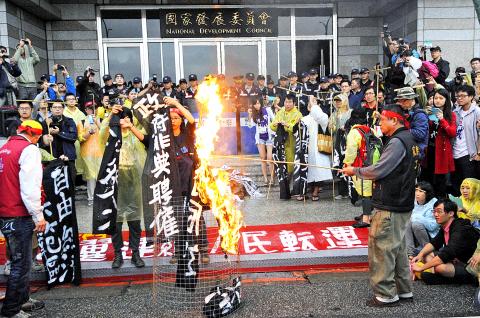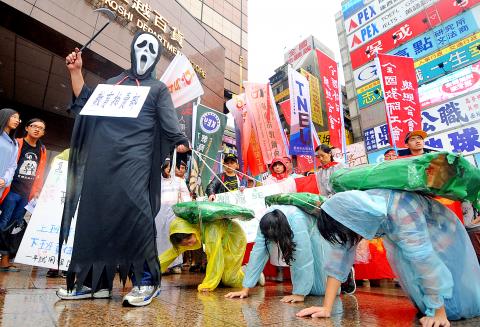After convening at three rallies held in different locations across Taipei, nearly 1,000 protesters carrying flags and banners swarmed the MRT yesterday to participate in the Autumn Struggle (秋鬥), an annual protest march organized by labor groups, congregating in Ximending (西門町) before marching on to protest in front of the National Development Council.
The train ride was included as part of the protest as a critique against the “capitalist values” the MRT represents, protest organizers said, adding that although most might see the trains as a symbol of urban development, they also function as a “transportation belt” to “send overworked employees into the hands of their employers every day.”
As the three processions moved through the streets in rainy weather, protesters shouted slogans including “We want economic democracy with the workers in charge” and “Citizens take a left turn, return the nation to the people” over the rhythmic beat of makeshift drums made from empty water barrels.

Photo: Chen Chih-chu, Taipei Times
The annual event, first held in 1993 by the Committee for Action on Labor Legislation and later by its successor movement Raging Citizens Act Now, focuses on different labor rights-related themes each year, and acts as a rallying call for many activist groups to express their outrage toward government policies that they say are skewed toward capitalists and large corporations.
This year, organizers accused the newly formed National Development Council of “single-minded pursuit of economic development” and its proposal to establish free economic pilot zones — special territories with reduced tariffs and other trade incentives — which the organizers say would exacerbate economic inequality and increase unjust cases of land seizures.
The initial three rallies, which started at noon, invited participation from more than 60 activist groups to participate according to three themes: land rights or movements against forced expropriation projects; labor rights advocates; and student groups campaigning against the privatization of higher education.

Photo: Liao Chen-huei, Taipei Times
Scuffles with police occurred when land rights activists attempted to enter the Democratic Progressive Party’s (DPP) headquarters to protest what they say is the party’s inaction in protecting people against land expropriation projects, with the protesters leaving banners that labeled the party “The Regressive Party” before leaving.
The protesters also gathered in front of Chinese Nationalist Party (KMT) Taipei mayoral candidate Sean Lien’s (連勝文) campaign headquarters, bestowing on him a large inscribed placard that read: “[For your] contribution to luxury mansions,” a sarcastic reference to Lien’s residence in The Palace (帝寶) — the most expensive piece of real-estate in Taiwan — as well as his alleged connections with wealthy corporations.
The three processions gathered at the Ximending MRT station at about 3pm, crowding the platforms before streaming out to attend a joint demonstration outside.
The day’s events ended with the activists marching to protest in front of the National Development Council while carrying a large fake turd over their heads — an allusion to President Ma Ying-jeou’s (馬英九) vow to create a “golden decade (黃金十年)” of economic development, which in Mandarin, is pronounced similarly to “golden year of the turd (黃金屎年).”

‘DENIAL DEFENSE’: The US would increase its military presence with uncrewed ships, and submarines, while boosting defense in the Indo-Pacific, a Pete Hegseth memo said The US is reorienting its military strategy to focus primarily on deterring a potential Chinese invasion of Taiwan, a memo signed by US Secretary of Defense Pete Hegseth showed. The memo also called on Taiwan to increase its defense spending. The document, known as the “Interim National Defense Strategic Guidance,” was distributed this month and detailed the national defense plans of US President Donald Trump’s administration, an article in the Washington Post said on Saturday. It outlines how the US can prepare for a potential war with China and defend itself from threats in the “near abroad,” including Greenland and the Panama

The Chinese Nationalist Party (KMT) is maintaining close ties with Beijing, the Democratic Progressive Party (DPP) said yesterday, hours after a new round of Chinese military drills in the Taiwan Strait began. Political parties in a democracy have a responsibility to be loyal to the nation and defend its sovereignty, DPP spokesman Justin Wu (吳崢) told a news conference in Taipei. His comments came hours after Beijing announced via Chinese state media that the Chinese People’s Liberation Army’s Eastern Theater Command was holding large-scale drills simulating a multi-pronged attack on Taiwan. Contrary to the KMT’s claims that it is staunchly anti-communist, KMT Deputy

RESPONSE: The government would investigate incidents of Taiwanese entertainers in China promoting CCP propaganda online in contravention of the law, the source said Taiwanese entertainers living in China who are found to have contravened cross-strait regulations or collaborated with the Chinese Communist Party (CCP) could be subject to fines, a source said on Sunday. Several Taiwanese entertainers have posted on the social media platform Sina Weibo saying that Taiwan “must be returned” to China, and sharing news articles from Chinese state media. In response, the Mainland Affairs Council (MAC) has asked the Ministry of Culture to investigate whether the entertainers had contravened any laws, and asked for them to be questioned upon their return to Taiwan, an official familiar with the matter said. To curb repeated

Myanmar has turned down an offer of assistance from Taiwanese search-and-rescue teams after a magnitude 7.7 earthquake struck the nation on Friday last week, saying other international aid is sufficient, the National Fire Agency said yesterday. More than 1,700 have been killed and 3,400 injured in the quake that struck near the central Myanmar city of Mandalay early on Friday afternoon, followed minutes later by a magnitude 6.7 aftershock. Worldwide, 13 international search-and-rescue teams have been deployed, with another 13 teams mobilizing, the agency said. Taiwan’s search-and-rescue teams were on standby, but have since been told to stand down, as